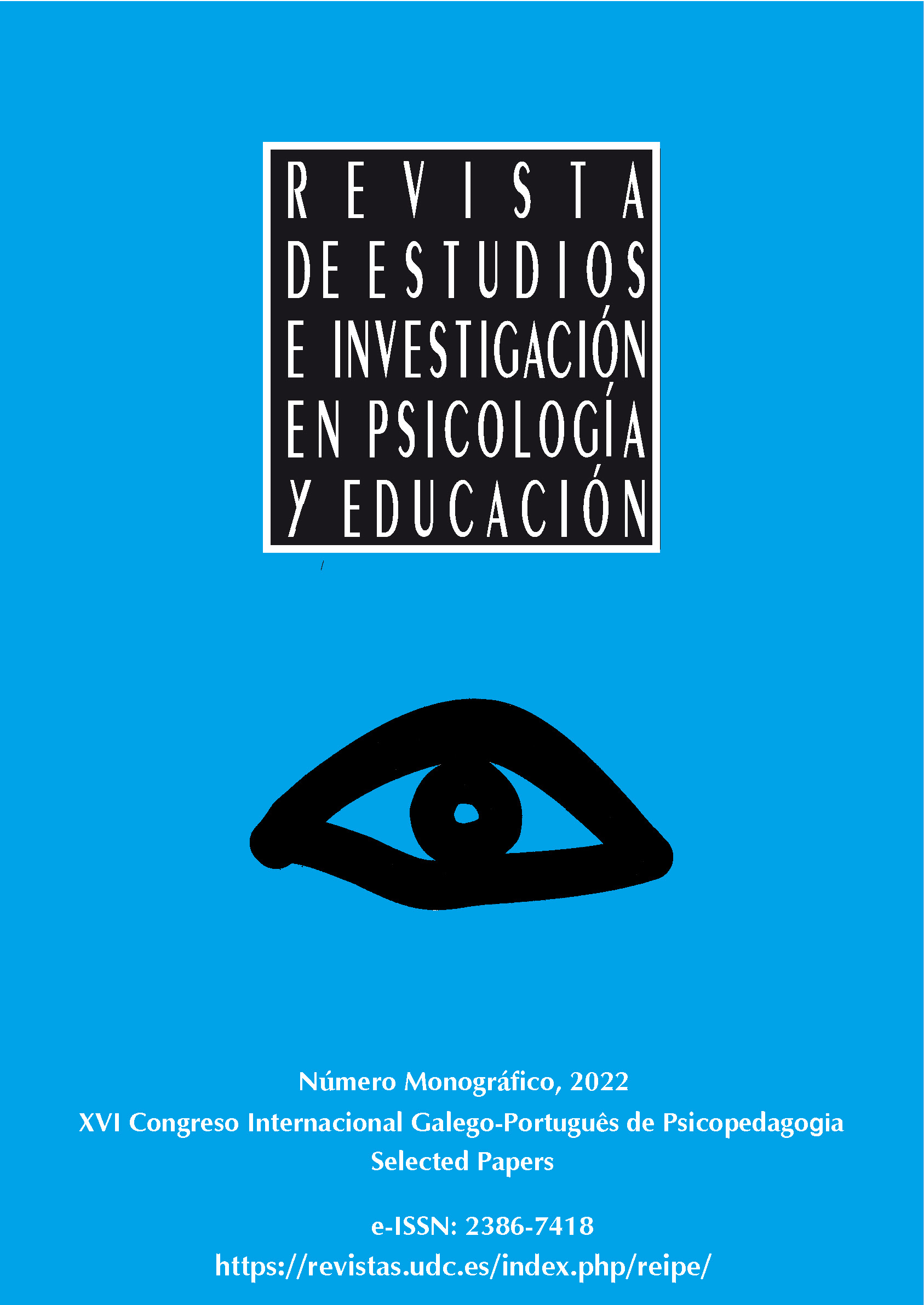Supporting University Students' Learning and Careers in a Pandemic Context
Main Article Content
Abstract
The Covid-19 pandemic is an unexpected and unpredictable event that generates multiple challenges and difficulties for individuals in various contexts of their lives, including academic life and career more generally. This study aimed to identify and prioritise the psychoeducational support needs of university students in times of the COVID-19 pandemic. A total of 261 Portuguese students of both genders (n = 209, 80.1% female), aged between 18 and 50 years (M = 22.17, SD = 4.36), attending undergraduate (n = 138, 52.9%) and postgraduate (123, 47.1%) degree courses, in domains as health, business, natural and social sciences, arts and humanities, engineering and technologies, in different higher education institutions, with emphasis on the northern region of the country (n = 187, 71.6%) participated in the study. There was a greater need for support in issues related to individual study, performance evaluation, time management, understanding interests and competencies, and career choices. The results of a two-way ANOVA indicate a main effect of academic level and an interaction effect of academic level and study cycle on learning concerns. In students with higher academic average, it is undergraduate students who have more learning support needs compared to postgraduate students. In university students with lower academic average, the opposite pattern was observed. With regard to the preferred support modalities, students showed more interest in individual counselling and workshops. The results of this study may guide research and career interventions with university students in pandemic and post-pandemic context.
Keywords:
Downloads
Article Details
References
Addus, A. A., Chen, D., & Khan, A. S. (2007). Academic performance and advisement of university students: A case study. College Student Journal, 41(2), 316-327. https://link.gale.com/apps/doc/A163679000/AONE?u=anon~54df8ab9&sid=googleScholar&xid=8d67bc66
Ainscough, L., Stewart, E., Colthorpe, K., & Zimbardi, K. (2018). Learning hindrances and self-regulated learning strategies reported by undergraduate students: identifying characteristics of resilient students. Studies in Higher Education, 43(12), 2194-2209. https://doi.org/10.1080/03075079.2017.1315085
Akkermans, J., Richardson, J., & Kraimer, M. (2020). The Covid-19 crisis as a career shock: Implications for careers and vocational behavior. [Editorial]. Journal of Vocational Behavior, 199, 1-5. https://doi.org/10.1016/j.jvb.2020.103434
Aluede, O., Imhonde, H., & Eguavoen, A. (2006). Academic, Career and Personal Needs of Nigerian University Students. Journal of Instructional Psychology, 33(1), 50–57.
Cordeiro, P. M., Paixão, M. P. B. A., Silva, J. T., Castro, M. G. de, & Morais, M. M. (2020). O Early Warning System of School Failure – SAPIE: Presentation of a digital system supporting inclusive education. Psychologica, 63(1), 139-152. https://doi.org/10.14195/1647-8606_63-1_8
Ferradás, M., Freire, C., Rodríguez, S., & Piñeiro, I. (2015). Estrategias de self-handicapping en estudiantes universitarios. Diferencias entre cursos. Revista de Estudios e Investigación en Psicología y Educación, (01), 063-066. https://doi.org/10.17979/reipe.2015.0.01.345
Fouad, N. A. (2020). Editor in chief's introduction to essays on the impact of COVID-19 on work and workers. [Editorial]. Journal of Vocational Behavior, 199, 1-2. https://doi.org/10.1016/j.jvb.2020.103441
Ordem dos Psicólogos Portugueses (OPP, 2020). Transições escolares, recomendações para profissionais (administradores escolares, psicólogos, educadores e professores). Ordem dos Psicólogos Portugueses. https://www.ordemdospsicologos.pt/pt/covid19/materiais_apoio
Gallagher, R. P., Golin, A., & Kelleher, K. (1992). The personal, career and learning skills needs of college students. Journal of College Student Development, 33, 301-309. Retrieved from https://psycnet.apa.org/record/1993-03494-001
Heredia, M. E. R., & Puga, A. M. M. (2021). Propuestas de las y los estudiantes de Psicología para mejorar los servicios universitarios. Enseñanza e Investigación en Psicología, 3(1), 10-24. https://www.revistacneip.org/index.php/cneip/article/view/171/107
Lamas, K. C. A., Ambiel, R. A., & de Lócio, B. T. A. (2014). Vivências acadêmicas e empregabilidade de universitários em final de curso. Temas em Psicologia, 22(2), 329-340. https://www.redalyc.org/articulo.oa?id=513751528006
Mella-Núñez, Ígor, Santos-Rego, M. Ángel, & Malheiro-Gutiérrez, X. M. (2015). Aprendizaje-Servicio y rendimiento académico del alumnado universitario. Revista de Estudios e Investigación en Psicología y Educación, (12), 035-039. https://doi.org/10.17979/reipe.2015.0.12.569
Pinto, J. C. (2019). Psychological Counseling in Portuguese Higher Education: What are the Students’ Needs? Universitas Psychologica, 18(5), 1-15. https://doi.org/10.11144/Javeriana.upsy18-5.pcph
Restubog, S. L. D., Ocampo, A. C. G., & Wang, L. (2020). Taking control amidst the chaos: Emotion regulation during the COVID-19 pandemic. https://doi.org/10.1016/j.jvb.2020.103440
Rudolph, C. W., & Zacher, H. (2020). COVID-19 and careers: On the futility of generational explanations. [Editorial]. Journal of Vocational Behavior, 199, 1-3. https://doi.org/10.1016/j.jvb.2020.103433
Taveira, M.C. & Silva, A.D. (2020). Linha de apoio psicológico SOS Covid-19: Linha de atendimento para psicólogos. [Manual não publicado]. Associação de Psicologia da Universidade do Minho.
Trolian, T. L., & Jach, E. A. (2019). Applied Learning in Higher Education: Conclusions and Recommendations for Institutional Leadership. New Directions for Higher Education, 2019(188), 101-106. https://doi.org/10.1002/he.20350
UNESCO. (2015). International Standard Classification of Education (ISCED): Fields of Education and Training 2013. UNESCO Institute for Statistics. https://doi.org/10.15220/978-92-9189-179-5-en
Zhou, Y., & Wang, J. (2019). Goal orientation, learning strategies, and academic performance in adult distance learning. Social Behavior and Personality: an international journal, 47(7), 1-20. https://doi.org/10.2224/sbp.8195



